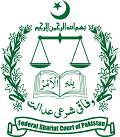Objectives & Functions
Objectives
The Judges of the Court, since its inception in 1980, armed with the provision of the Constitution, serving the glory of Islam, and dedicating themselves to the sacred task, laid down a sizable body of judgments, which taken together constitute a remarkable chapter in the history of Islamic law. The task continues as new problems emerge and the consistent stream of fresh legislation gives rise to new questions.
The policy of the Federal Shariat Court is that the delay in the disposal of cases may be averted. Islamic norms demand the very prompt redressal of grievances. In fact, the concept of ‘Adl in the Holy Qur’an and the Sunnah of the Holy Prophet (peace be upon him) demands that there should be no delay in the dispensation of justice. Even the Western concept is that justice delayed is justice denied. The Judges of this Court exercise tact, wisdom, knowledge and authority to see that the hearing of cases may not be unreasonably delayed at the instance of any one. To provide justice to the litigants at their doorsteps and to hear cases filed in Bench Registries of this court at Lahore, Karachi, Peshawar and Quetta. The Branches of this Court hold sittings at these seats.
The Rules of the Court provide for free legal representation in cases where an appeal is filed from jail and the appellant is not in a position to pay for the services of a lawyer irrespective of the quantum of his sentences. Federal Shariat Court has taken a lead in this respect as compared even to the most advanced countries in the world. The legal representation over there is generally provided to a pauper accused mostly through free legal aid societies and the Courts rarely pay the bills of such representation.
Another important feature of the working of this Court is that no Court fee is payable either on petitions or appeals While exercising its suo moto jurisdiction, the Court’s policy is to take into confidence, and to associate in its working, the lawyers, the Ulema, the social reformers, the intellectuals and other members of the public.With this purpose in view public notices are published in leading Newspapers of the country inviting comments as well as representation from the citizens of Pakistan.
Functions
Article 227 makes it incumbent that all existing laws shall be brought in conformity with the injunctions of Islam as laid down in the Holy Qur’an and the Sunnah of the Holy Prophet (peace be upon him), and Chapter 3-A which pertains to the functions and organization of Federal Shariat Court, empowers the court and entrusts the court with the responsibility to examine and decide the question whether or not any law or provision of law is repugnant to the injunctions of Islam as laid down in the Holy Qur’an and the Sunnah of the Holy Prophet (peace be upon him).
(1) To examine any law as defined in Article 203-B(c) and decide the question whether or not any law or provision of law is repugnant to the Injunctions of Islam;
(2) By an amendment to Article 203-D of the Constitution in 1982, the Court was given the powers to act Suo Moto where any Law or provision of Law appears to be repugnant to the injunction of Islam.
(3) To exercise appellate jurisdiction, to hear and decide appeals in Hudood cases if the sentence of imprisonment awarded by the trial Court exceeds two years;
(4) To confirm or pass other appropriate order about any Hadd punishment awarded by the trial Court in Hudood laws. Until it is so confirmed, no Hadd punishment can be executed; and
(5) To exercise revisional powers to call for any case decided by any Criminal Court under any law in relation to the enforcement of Hudood.
Powers and Procedure of the Court
1. For the purposes of the performance of its functions, the court have the powers of a Civil Court trying a suit under the Code of Civil Procedure, 1908 (Act V of 1908), in respect of the following matters, namely:-
a) summoning and enforcing the attendance of any person and examining him on oath;
b) requiring the discovery and production of any document;
c) receiving evidence on affidavits; and
d) issuing commissions for the examination of witnesses or documents.
2) The court have power to conduct its proceedings and regulate its procedure in all respects as it deems fit.
3) The court have the power of a High Court to punish its own contempt.
4) A party to any proceedings before the court under clause (1) of Article 203D may be represented by a legal practitioner who is a Muslim and has been enrolled as an advocate of a High Court for a period of not less than five years or as an advocate of the Supreme Court or by a jurisconsult selected by the party from out of a panel of jurisconsults maintained by the court for the purpose.
5) For being eligible to have his name borne on the panel of jurisconsults referred to in clause (4), a person shall be an aalim who, in the opinion of the court, is well-versed in Shariat.
6) A legal practitioner or jurisconsult representing a party before the court shall not plead for the party but shall state, expound and interpret the Injunctions of Islam relevant to the proceedings so far as may be known to him and submit to the court a written statement of his interpretation of such injunctions of Islam.
7) The court may invite any person in Pakistan or abroad whom the court considers to be well-versed in Islamic law to appear before it and render such assistance as may be required of him.
8) No court fee is payable in respect of any petition or application made to the court under Article 203D.
